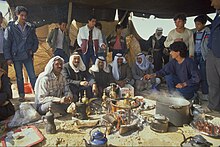Palestinian bedouin

Bedouin men at a hafla
|
|
| Total population | |
|---|---|
| Over 200,000 | |
| Regions with significant populations | |
|
|
200,000-210,000 |
| Languages | |
| Arabic (mainly Bedouin dialect, also Egyptian and Palestinian), Hebrew (Modern Israeli) | |
| Religion | |
| Islam | |
The Negev Bedouin (Arabic: بدو النقب, Badū an-Naqab; Hebrew: הבדואים בנגב Habeduim Banegev) are traditionally pastoral nomadic Arab tribes living in the Negev region in Israel.
From 1858 during Ottoman rule, the Negev Bedouin underwent a process of sedentarization which accelerated after the founding of Israel. In the 1948 Arab–Israeli War, most resettled in neighbouring regions. Between 1968 and 1989, Israel built seven townships in the northeast of the Negev for the Bedouin population, with about half of them relocating to these areas. Others remained in unrecognized villages built without planning which lacked basic services such as electricity and running water. The Israeli government has gradually recognized some of them and taken measures to improve infrastructure and basic services, while the majority are slated for destruction with the population facing forced displacement. The Prawer Plan was drawn up to address land ownership claims and compensation. The plan also called for the evacuation of 35 unrecognized villages and the resettlement of residents in existing or new towns. According to human rights organizations opposed to the plan, it discriminated against the Bedouin population of the Negev and violated the community's historic land rights. In December 2013, the plan was rescinded.
The Bedouin population in the Negev numbers 200,000-210,000. Just over half of them live in seven government-built Bedouin-only towns; the remaining 90,000 live in 46 villages – 35 of which are unrecognized and 11 of which were officially recognized 10 years ago.
Negev Bedouin used to be nomadic and later also semi-nomadic Arabs who live by rearing livestock in the deserts of southern Israel. The community is traditional and conservative, with a well-defined value system that directs and monitors behaviour and interpersonal relations.
...
Wikipedia
